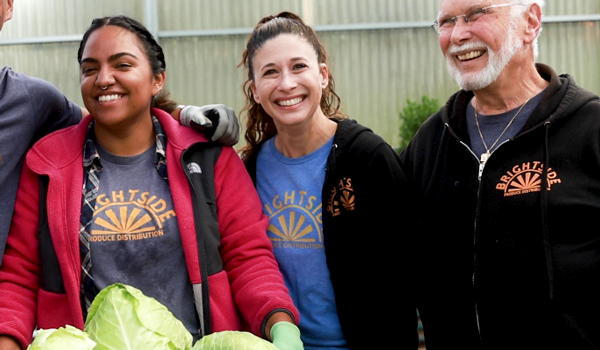SDSU Marketing Professor Named Zahn Professor of Creativity and Innovation

Iana Castro, professor of marketing at San Diego State University’s Fowler College of Business, has been named the university’s Zahn Professor of Creativity and Innovation by SDSU’s Division of Research and Innovation.
The award provides two years of support for a faculty member to enhance innovation and entrepreneurship efforts by creating new learning opportunities for students in all majors around a specific subject matter.
In her new role, Castro will work with SDSU students, staff and faculty to develop new solutions to tackle the persistent issue of food insecurity. This effort will encompass a range of challenges, including transportation and logistics, the impact of natural disasters such as droughts and wildfires, and difficulties related to packaging and processing.
“The food system is complex and breakdowns in the system can occur easily at any point,” said Castro. “We need new approaches to getting food from producers to consumers and we need a wide range of expertise to explore new and innovative ways to fix some of those breakdowns.”
According to Castro, food insecurity affects a broader segment of the population than just those who cannot afford food. For example, those who are experiencing food insecurity also include those who are rationing food, lack easy access to food sources, or cannot afford fresh produce, eggs or lean meat.
“In San Diego County, over 10% of the population and over 100,000 children experience food insecurity,” she said. “It’s believed that between 25% and 60% of college students are experiencing food insecurity, and these rates have risen since COVID.”
To increase awareness of this issue, Castro has launched a messaging campaign to university faculty and staff to gauge their interest in creating awareness of food insecurity issues through class assignments, student organization activities, or launching entrepreneurial enterprises that address the issue.
“Students in multiple classes are working on understanding the specific needs of San Diego State University students,” said Castro. “We are eager to share their results with the Economic Crisis Response Team within the university’s Basic Needs Center in order to assist our students who face food insecurity issues.”
Additionally, food insecurity will be front-and-center when student teams from colleges from across southern California apply to compete in the 2025 Social Venture Challenge,. The teams vie for over $35,000 in cash prizes as they present their business plans for enterprises that offer innovative resolutions to pressing social issues.
Castro has also heard from many other potential campus partners who have presented ideas on how they can actively engage in understanding food insecurity challenges and coming up with solutions. One of those partners is Steven Gill, accounting professor at SDSU’s Charles W. Lamden School of Accountancy, who will have students in his class create informational brochures for restaurants that explain the legal and tax implications of donating their excess food instead of throwing it away.
“As part of the assignment, students will present a 10 – 15 minute ‘elevator pitch’ type proposal about the advantages of donating edible food to charitable organizations,” said Gill. “The objective is to teach students how to effectively inform their future food, hospitality, and retail clients about potential tax breaks that also help the community.”
Castro says she’s looking forward to seeing the outcomes of Gill’s project, as well as projects that emerge from other campus partners who are addressing food insecurity from different disciplines and perspectives to see how well these ideas could actually work when put into practice.
Castro first became interested in addressing food insecurity nearly a decade ago when she was conducting academic research surrounding consumer food choices at a regional supermarket chain. “I visited a small corner store and noticed it had very few healthy food options available. That really struck a nerve with me. I thought ‘why are there no healthy options in stores where people buy food?’”
This realization, in part, eventually led to her establishing BrightSide Produce in 2017, an SDSU student-run produce distribution service that delivers fresh produce to 29 partner stores in the underserved areas of National City, California, as well as the south and southeastern regions within the city of San Diego. According to Castro, over 250 students have participated in BrightSide’s internship program, and, one day, she hopes to increase the organization’s reach through franchising agreements with other college campuses.
“I’m passionate about finding ways to resolve this issue,” Castro said. “It’s what I spend most of my waking hours thinking about.”

